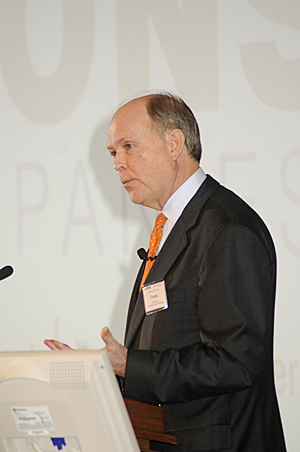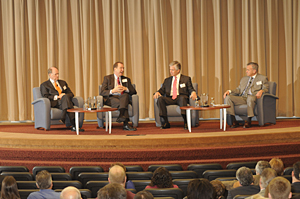

- Rozovsky wins prestigious NSF Early Career Award
- UD students meet alumni, experience 'closing bell' at NYSE
- Newark Police seek assistance in identifying suspects in robbery
- Rivlin says bipartisan budget action, stronger budget rules key to reversing debt
- Stink bugs shouldn't pose problem until late summer
- Gao to honor Placido Domingo in Washington performance
- Adopt-A-Highway project keeps Lewes road clean
- WVUD's Radiothon fundraiser runs April 1-10
- W.D. Snodgrass Symposium to honor Pulitzer winner
- New guide helps cancer patients manage symptoms
- UD in the News, March 25, 2011
- For the Record, March 25, 2011
- Public opinion expert discusses world views of U.S. in Global Agenda series
- Congressional delegation, dean laud Center for Community Research and Service program
- Center for Political Communication sets symposium on politics, entertainment
- Students work to raise funds, awareness of domestic violence
- Equestrian team wins regional championship in Western riding
- Markell, Harker stress importance of agriculture to Delaware's economy
- Carol A. Ammon MBA Case Competition winners announced
- Prof presents blood-clotting studies at Gordon Research Conference
- Sexual Assault Awareness Month events, programs announced
- Stay connected with Sea Grant, CEOE e-newsletter
- A message to UD regarding the tragedy in Japan
- More News >>
- March 31-May 14: REP stages Neil Simon's 'The Good Doctor'
- April 2: Newark plans annual 'wine and dine'
- April 5: Expert perspective on U.S. health care
- April 5: Comedian Ace Guillen to visit Scrounge
- April 6, May 4: School of Nursing sponsors research lecture series
- April 6-May 4: Confucius Institute presents Chinese Film Series on Wednesdays
- April 6: IPCC's Pachauri to discuss sustainable development in DENIN Dialogue Series
- April 7: 'WVUDstock' radiothon concert announced
- April 8: English Language Institute presents 'Arts in Translation'
- April 9: Green and Healthy Living Expo planned at The Bob
- April 9: Center for Political Communication to host Onion editor
- April 10: Alumni Easter Egg-stravaganza planned
- April 11: CDS session to focus on visual assistive technologies
- April 12: T.J. Stiles to speak at UDLA annual dinner
- April 15, 16: Annual UD push lawnmower tune-up scheduled
- April 15, 16: Master Players series presents iMusic 4, China Magpie
- April 15, 16: Delaware Symphony, UD chorus to perform Mahler work
- April 18: Former NFL Coach Bill Cowher featured in UD Speaks
- April 21-24: Sesame Street Live brings Elmo and friends to The Bob
- April 30: Save the date for Ag Day 2011 at UD
- April 30: Symposium to consider 'Frontiers at the Chemistry-Biology Interface'
- April 30-May 1: Relay for Life set at Delaware Field House
- May 4: Delaware Membrane Protein Symposium announced
- May 5: Northwestern University's Leon Keer to deliver Kerr lecture
- May 7: Women's volleyball team to host second annual Spring Fling
- Through May 3: SPPA announces speakers for 10th annual lecture series
- Through May 4: Global Agenda sees U.S. through others' eyes; World Bank president to speak
- Through May 4: 'Research on Race, Ethnicity, Culture' topic of series
- Through May 9: Black American Studies announces lecture series
- Through May 11: 'Challenges in Jewish Culture' lecture series announced
- Through May 11: Area Studies research featured in speaker series
- Through June 5: 'Andy Warhol: Behind the Camera' on view in Old College Gallery
- Through July 15: 'Bodyscapes' on view at Mechanical Hall Gallery
- More What's Happening >>
- UD calendar >>
- Middle States evaluation team on campus April 5
- Phipps named HR Liaison of the Quarter
- Senior wins iPad for participating in assessment study
- April 19: Procurement Services schedules information sessions
- UD Bookstore announces spring break hours
- HealthyU Wellness Program encourages employees to 'Step into Spring'
- April 8-29: Faculty roundtable series considers student engagement
- GRE is changing; learn more at April 15 info session
- April 30: UD Evening with Blue Rocks set for employees
- Morris Library to be open 24/7 during final exams
- More Campus FYI >>
4:46 p.m., Jan. 14, 2009----The current economic recession is likely to last into the second half of this year, with overall economic growth remaining below 2 percent, Charles I. Plosser, president and chief executive officer of the Federal Reserve Bank of Philadelphia, said during the 2009 Economic Forecast on Wednesday, Jan. 14, at the University of Delaware's Clayton Hall.
“I expect the housing sector will finally hit bottom in 2009 and the financial markets will gradually return to some semblance of normalcy. So my forecast sees the economy starting to slowly recover in the second half of 2009 and building up more momentum in 2010,” said Plosser, who was the featured speaker at the annual event, hosted by Lyons Companies and the University of Delaware Center for Economic Education and Entrepreneurship.
The event opened with remarks by University of Delaware President Patrick T. Harker and an introduction of Plosser and panelists by David Lyons.
Plosser said economic growth in 2009, which follows negative growth in 2008, is likely to remain below two percent this year. He added the current recession could be one of the longest since World War II, but not as deep as the recession in the 1980s that saw the unemployment rate rise to more than 10.5 percent.
“I do not expect the unemployment rate to stray into the double digits during this recession,” Plosser said. “Yet, I also don't expect it to begin coming down soon. Keep in mind that unemployment is a lagging indicator. It will not begin to come down until after the economy is well on its way to recovery.”
Plosser cautioned that while the unprecedented measures taken by the Federal Reserve will have a positive impact in the short run, excess liquidity could cause major inflation problems in the long run.
“I believe we need to monitor liquidity and its composition closely, so that we are able to withdraw it when the time comes or else we risk fueling inflation in the future,” Plosser said. “Thus, it is not appropriate to ignore quantitative metrics in this new policy environment.”
Panel discussion
The event included a panel discussion by Plosser and national and global economists Michael K. Farr, president of Farr Miller & Washington, LLC, and David R. Malpass, of Encima Global, LLC, led by James B. O'Neill, University of Delaware professor of economics and director of the Center for Economic Education and Entrepreneurship in the Lerner College of Business and Economics.
Malpass said the current recession is rooted in several factors, from the “free lunch” in the form of low interest rates from 2003-06 that were championed by Alan Greenspan, former chairman of the Federal Reserve, to loose lending standards and a weakening U.S. dollar that caused capital flight and a spike in the trade of gold and commodities.
The bankruptcy of Lehman Brothers sent the economy into a sharp slide, as investor confidence was further eroded, Malpass said. The negative impact on the markets is now being fixed and the ongoing purchase of mortgage-backed securities by the Federal Reserve are reasons for optimism that the economy will experience positive housing market trends and, therefore, begin to recover later this year.
Farr blamed low interest rates, the explosion of securitization of risky loans, and a culture of blaming someone else, even by many homebuyers who misrepresented their income to buy homes they could not afford, for some of the economic problems that the country is facing.
The current recession, Farr said, has already run longer than nine of the last 11 recessions, but “recessions are a normal part of the economic cycle and are indeed necessary for the long-term health of the economy.”
Farr predicted that the economic contraction will continue through the end of 2009, but the expected bottoming of housing prices and improved credit markets will lead to recovery, but a large inventory of housing -- now at 11 months' worth, compared to a normal supply of four months -- will slow the recovery.
The Delaware economy
O'Neill told the audience of about 400 business and community leaders, educators and students that while the Delaware economy also is facing some problems, the rejuvenation that the state experienced from the Financial Services Act in the 1980s should serve as an example of how the spirit of entrepreneurship can turn a problem into an opportunity.
“It's time for our state to recognize the strength we have -- that we are not a state economy, we are a regional economy and we have some effect that goes well beyond our borders,” O'Neill said.
“We have a governor-elect (Jack Markell) who believes in entrepreneurship,” O'Neill said. “We also have someone who is coming in as director of economic development who has some experience in the private sector, who will be seeking to push the state of Delaware forward. So, even though it seems like bleak times, be optimists, things will get better.”
Article by Martin A Mbugua
Photos by Duane Perry


